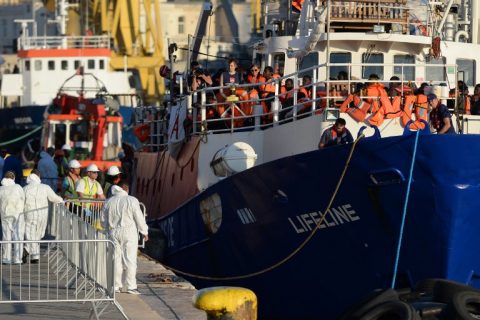
by Arman Soldin
Agence France-Presse
VALLETTA, Malta (AFP) – A rescue boat stranded for nearly a week in the Mediterranean with over 200 migrants docked in Malta Wednesday, after a deal was struck between a group of EU states to take them in.
Lifeline, a vessel for the German charity Mission Lifeline, had been waiting for permission to enter a port for six days after rescuing 234 migrants off the coast of Libya last Thursday.
After finally docking in the port of Valletta, the captain of the ship was taken to the Maltese police headquarters for questioning, the government said in a statement.
Maltese Prime minister Joseph Muscat earlier warned that after the migrants had disembarked the Lifeline ship would be impounded in order to carry out an investigation into its legal status and actions on the night of the rescue.
Mission Lifeline has come under fire from EU leaders who accuse it of contravening international law by rescuing the migrants when the Libyan coastguard was already intervening.
But shortly after its arrival in Valletta, the charity remained defiant, tweeting: “Finally, Lifeline arrived in the port! Donate now for our next rescue missions.”
Extensive security measures were in place as the ship came in.
A spokeswoman for the prime minister at the scene said three mothers and their babies had been taken to hospital.
Muscat said the migrants would be processed and “genuine asylum-seekers will be afforded protection”, while “procedures will be started immediately to return those that do not qualify… in accordance with the law”.
But he insisted that the arrival was “unique” and could not be considered a blueprint for handling future rescues.
One-off operation
The vessel’s fate had been hanging in the balance as bloc members remained at loggerheads over how to handle the influx of people trying to reach the continent.
The boat, refused by Italy, was allowed to dock only after Malta, Italy, Luxembourg, the Netherlands, Portugal, Ireland, Belgium and France agreed to welcome some of the migrants.
Belgium and Luxembourg said they would each take 15 of the Lifeline migrants. The Netherlands will take 20, while Portugal announced it would accept around a tenth of those on board.
Theo Francken, Belgian minster for asylum and migration, tweeted that Belgium would help Malta but that it must be one-off operation.
The NGO’s co-founder Axel Steier blamed Germany’s failure to participate in the deal on the country’s hardline Interior Minister Horst Seehofer.
Seehofer has taken a strong stance on immigration and given German Chancellor Angela Merkel an ultimatum to curb arrivals to Germany.
Sixteen EU leaders held emergency talks in Brussels on Sunday in a bid to break the longstanding deadlock over who should take in migrants.
A full EU summit scheduled for Thursday and Friday is expected to be dominated by the divisive issue.
Playing into smugglers’ hands
Mission Lifeline has hit back at criticism levelled at it by EU leaders.
On Tuesday, French President Emmanuel Macron said the charity had contravened “all the rules” by rescuing the migrants when the Libya coastguard was already intervening.
Macron accused Mission Lifeline of “playing into the hands of smugglers”.
But the charity denied breaking the law in a statement on Wednesday.
“There have been a number of false accusations that Lifeline ignores orders by different MRCCs (maritime rescue coordination centres),” said Steier.
Lifeline argued the migrants would not be safe in Libya, where they have faced abuse and rape in holding centres, and that returning them there would breach international refugee law.
“The only order the ship denied was to hand over people to the so-called Libyan coastguard, as this would have been not in line with the Geneva Refugee Convention and therefore criminal.”
‘The doors aren’t open’
Italy’s far-right Interior Minister Matteo Salvini had hailed the news that a second migrant ship he had turned away was being taken in elsewhere.
Earlier this month, Rome rejected the Aquarius ship carrying 630 migrants, forcing it to eventually dock in Spain.
“For women and children really fleeing the war the doors are open, for everyone else they are not!” Salvini tweeted.
The decision by Italy’s new hardline government to turn away rescue vessels has plunged Europe into a political crisis over how to collectively handle the huge numbers of people migrating from Africa, the Middle East and Asia.
Italy and Malta say they are unfairly bearing the brunt of the new arrivals, while other European countries are urging more forceful policies to block their entry.








